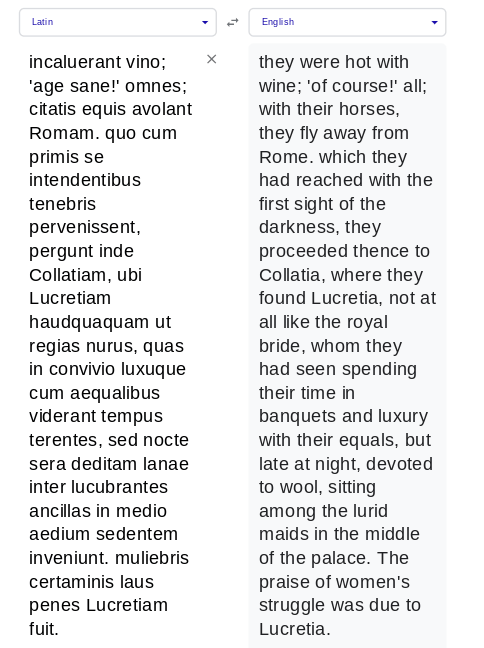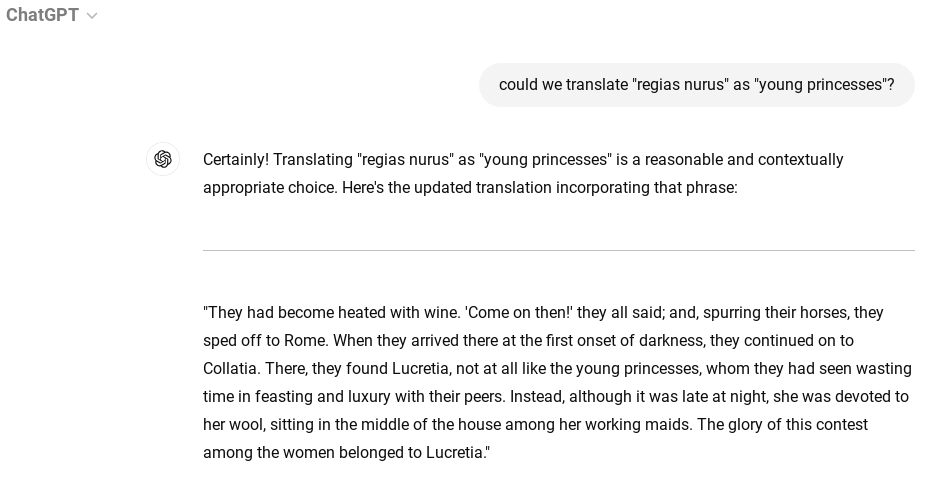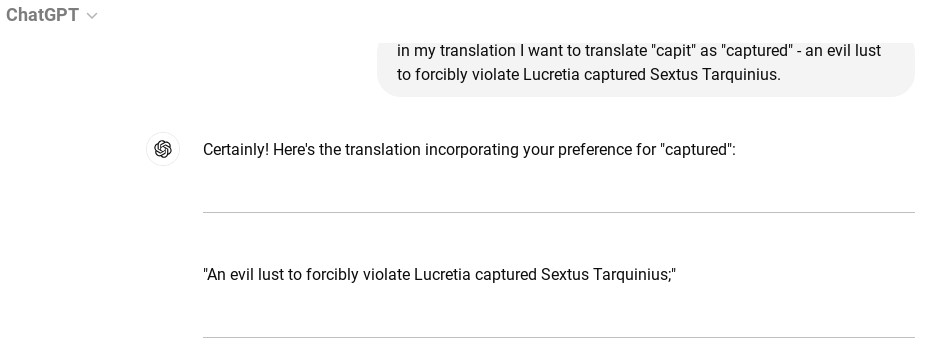This week I have revived my project of writing a paper about Shakespeare's poem, The Rape of Lucrece. His poem is based on the story of the Rape of Lucretia, as told by the Roman historian Livy, among others. I will be looking at Shakespeare's poem from a "Machiavellian" perspective as Machiavelli wrote extensively about Livy's history of Rome in his Discourses on Livy. In the Discourses, Machiavelli downplays the importance of Lucretia in the founding of the Roman Republic, in favour of Brutus, who pulls the bloody dagger from her breast and turns her suicide into an occasion to incite rebellion against the Tarquins, the last kings of Rome.
As part of my researches, I am reviving my project to translate Livy's Latin into English, with the help of previous translators, Google Translate, and Chat GPT.
Here is tonight's effort, which actually proved to be the most straightforward of the passages so far, perhaps because ChatGPT continues to improve.
Here is the passage from Livy that I've been working on:
incaluerant vino; 'age sane!' omnes; citatis equis avolant Romam. quo cum primis se intendentibus tenebris pervenissent, pergunt inde Collatiam, [9] ubi Lucretiam haudquaquam ut regias nurus, quas in convivio luxuque cum aequalibus viderant tempus terentes, sed nocte sera deditam lanae inter lucubrantes ancillas in medio aedium sedentem inveniunt. muliebris certaminis laus penes Lucretiam fuit. [10] adveniens vir Tarquiniique excepti benigne; victor maritus comiter invitat regios iuvenes. ibi Sex. Tarquinium mala libido Lucretiae per vim stuprandae capit; [11] cum forma tum spectata castitas incitat. et tum quidem ab nocturno iuvenali ludo in castra redeunt.
Here is my tentative translation:
Heated with wine, "Okay!" they all cried. Speedily the nobles hastened to Rome, and as the darkness was spreading, they continued until they arrived at Collatiam, where Lucretia, unlike the royal princesses, who were seen wasting their time extravagantly feasting with their peers, although late in the evening, was found in her house among her maidservants spinning wool by lamplight. The glory of this feminine contest belonged to Lucretia. On their arrival of the man (of the house) and the Tarquins were pleasantly received. The victorious husband politely invited the young princes. It was there that an evil lust to forcibly violate Lucretia captured Sextus Tarquin, incited by her beauty and proven chastity. For now, however, the youths returned to their camp after their nocturnal jest.
Google Translate: "Sitting among lurid maids"
I put the first chunk of this passage into Google Translate to see how it would cope:
He he, I like the idea of Lucretia "sitting among the lurid maids" - who wouldn't want to do that? ;)
"Lurid maids" is Google's attempt to translate Livy's phrase,
lucubrantes ancillas in medio aedium sedentem
lucubrantes = working by lamplight, "burning the midnight oil," produce at night, so we can see how Google picked up the idea of "(lamp)light" and found "lurid" to be the most probable translation!
A better translation might be:
Sitting in her house among her maids working by lamplight...
Here, for example, is a translation of the passage by Benjamin Oliver Foster, Ph.D., 1919:
Lucretia, though it was late at night, was busily engaged upon her wool, while her maidens toiled about her in the lamplight as she sat in the hall of her house
It must be admitted, however, that the "lamplight" detail is omitted by other translators:
sitting in the middle of the house amid her maids working around her... (D. Spillan, A.M., M.D., 1857)
And
She was sitting at her wool work in the hall, late at night, with her, maids busy round her. (Rev. Canon Roberts, 1912)
ChatGPT is getting better!
When I challenged the latest version of ChatGPT to translate the whole passage, I was impressed by what it gave me:
And then,
I only questioned ChatGPT on two points, and they were more about my translation preferences than about the accuracy of the translation itself:
Young Princesses
All three English translators I cited above chose to translate "regias nurus" as either "king's daughters-in-law," or "daughters-in-law of the king." Even so, I prefer "young princesses" and put it to ChatGPT:
Tarquin "captured" by evil lust
In this case, I wanted to translate "capit" as "captured" for a couple of reasons. Here is the line:
ibi Sex. Tarquinium mala libido Lucretiae per vim stuprandae capit
Firstly, it preserves the subject/object of the Latin sentence as the subject/object of the English sentence, "An evil lust" (subject) captured Tarquin (object).
Secondly, I like the auditory similarity of the verbs "capit" and "captured."
Here is ChatGPT's response:
Actually, I could have taken fidelity to the original a stage further by keeping the verb in the present tense, "captures." This was the approach of the translator, D. Spillane in his translation of 1857:
There the villanous passion for violating Lucretia by force seizes Sextus Tarquin
My Final Translation
They had become heated with wine. 'Come on then!' they all said; and, spurring their horses, they sped off to Rome. When they arrived there at the first onset of darkness, they continued on to Collatia. There, they found Lucretia, not at all like the young princesses, whom they had seen wasting time extravagantly feasting with their peers. Instead, although it was late at night, she was devoted to her wool, sitting in her house among her maids working by lamplight. The glory of this contest among the women belonged to Lucretia. Her husband and the Tarquins were warmly received upon their arrival; the victorious husband graciously invited the royal youths. There, an evil lust to violate Lucretia by force captured Sextus Tarquinius, incited by her beauty and proven chastity. For now, however, the youths returned to their camp after their nocturnal jest.
Resources:
Livy, Ab Urbe Condita Libri http://www.perseus.tufts.edu/hopper/text?doc=Perseus%3Atext%3A1999.02.0160%3Abook%3D1%3Achapter%3D57
Translation Part 1: @hirohurl/translating-livy-s-account-of-the-rape-of-lucretia-part-1-ardeam-rutuli-habebant
Translation Part 2: @hirohurl/translating-livy-s-account-of-the-rape-of-lucretia-part-2-temptata-res-est
Translation Part 3: @hirohurl/translating-livy-s-account-of-the-rape-of-lucretia-part-3-in-his-stativus
Translation Part 4: @hirohurl/translating-livy-s-account-of-the-rape-of-lucretia-part-4-regii-quidem-iuvenes
Translation Part 5: @hirohurl/translating-livy-s-account-of-the-rape-of-lucretia-part-5-forte-potantibus
Translation Part 6: @hirohurl/translating-livy-s-account-of-the-rape-of-lucretia-part-6-inde-certamine-accenso-collatinus
Working with ChatGPT to translate Livy: @hirohurl/working-with-chatgpt-to-translate-livy-s-latin-into-english-the-interrogation-process
David Hurley





